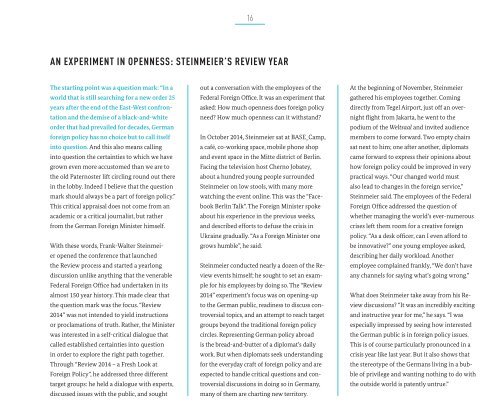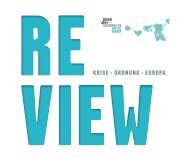Review 2014 – A Fresh Look at German Foreign Policy
“Crisis, Order, Europe” – these keywords highlight the main challenges for German Foreign Policy in the medium term. The project “Review 2014 – A Fresh Look at German Foreign Policy”, initiated by Foreign Minister Frank-Walter Steinmeier, has open up a broad public debate about the aims, interests and perspectives of German foreign policy. This report details the discussions of the past year, the expectations with regard to Germany’s global role raised within Germany and abroad as well as the foreign policy challenges in the future.
“Crisis, Order, Europe” – these keywords highlight the main challenges for German Foreign Policy in the medium term. The project “Review 2014 – A Fresh Look at German Foreign Policy”, initiated by Foreign Minister Frank-Walter Steinmeier, has open up a broad public debate about the aims, interests and perspectives of German foreign policy. This report details the discussions of the past year, the expectations with regard to Germany’s global role raised within Germany and abroad as well as the foreign policy challenges in the future.
Create successful ePaper yourself
Turn your PDF publications into a flip-book with our unique Google optimized e-Paper software.
16<br />
AN EXPERIMENT IN OPENNESS: STEINMEIER’S REVIEW YEAR<br />
The starting point was a question mark: “In a<br />
world th<strong>at</strong> is still searching for a new order 25<br />
years after the end of the East-West confront<strong>at</strong>ion<br />
and the demise of a black-and-white<br />
order th<strong>at</strong> had prevailed for decades, <strong>German</strong><br />
foreign policy has no choice but to call itself<br />
into question. And this also means calling<br />
into question the certainties to which we have<br />
grown even more accustomed than we are to<br />
the old P<strong>at</strong>ernoster lift circling round out there<br />
in the lobby. Indeed I believe th<strong>at</strong> the question<br />
mark should always be a part of foreign policy.”<br />
This critical appraisal does not come from an<br />
academic or a critical journalist, but r<strong>at</strong>her<br />
from the <strong>German</strong> <strong>Foreign</strong> Minister himself.<br />
With these words, Frank-Walter Steinmeier<br />
opened the conference th<strong>at</strong> launched<br />
the <strong>Review</strong> process and started a yearlong<br />
discussion unlike anything th<strong>at</strong> the venerable<br />
Federal <strong>Foreign</strong> Office had undertaken in its<br />
almost 150 year history. This made clear th<strong>at</strong><br />
the question mark was the focus. “<strong>Review</strong><br />
<strong>2014</strong>” was not intended to yield instructions<br />
or proclam<strong>at</strong>ions of truth. R<strong>at</strong>her, the Minister<br />
was interested in a self-critical dialogue th<strong>at</strong><br />
called established certainties into question<br />
in order to explore the right p<strong>at</strong>h together.<br />
Through “<strong>Review</strong> <strong>2014</strong> <strong>–</strong> a <strong>Fresh</strong> <strong>Look</strong> <strong>at</strong><br />
<strong>Foreign</strong> <strong>Policy</strong>”, he addressed three different<br />
target groups: he held a dialogue with experts,<br />
discussed issues with the public, and sought<br />
out a convers<strong>at</strong>ion with the employees of the<br />
Federal <strong>Foreign</strong> Office. It was an experiment th<strong>at</strong><br />
asked: How much openness does foreign policy<br />
need? How much openness can it withstand?<br />
In October <strong>2014</strong>, Steinmeier s<strong>at</strong> <strong>at</strong> BASE_Camp,<br />
a café, co-working space, mobile phone shop<br />
and event space in the Mitte district of Berlin.<br />
Facing the television host Cherno Job<strong>at</strong>ey,<br />
about a hundred young people surrounded<br />
Steinmeier on low stools, with many more<br />
w<strong>at</strong>ching the event online. This was the “Facebook<br />
Berlin Talk”. The <strong>Foreign</strong> Minister spoke<br />
about his experience in the previous weeks,<br />
and described efforts to defuse the crisis in<br />
Ukraine gradually. “As a <strong>Foreign</strong> Minister one<br />
grows humble”, he said.<br />
Steinmeier conducted nearly a dozen of the <strong>Review</strong><br />
events himself; he sought to set an example<br />
for his employees by doing so. The “<strong>Review</strong><br />
<strong>2014</strong>” experiment’s focus was on opening-up<br />
to the <strong>German</strong> public, readiness to discuss controversial<br />
topics, and an <strong>at</strong>tempt to reach target<br />
groups beyond the traditional foreign policy<br />
circles. Representing <strong>German</strong> policy abroad<br />
is the bread-and-butter of a diplom<strong>at</strong>’s daily<br />
work. But when diplom<strong>at</strong>s seek understanding<br />
for the everyday craft of foreign policy and are<br />
expected to handle critical questions and controversial<br />
discussions in doing so in <strong>German</strong>y,<br />
many of them are charting new territory.<br />
At the beginning of November, Steinmeier<br />
g<strong>at</strong>hered his employees together. Coming<br />
directly from Tegel Airport, just off an overnight<br />
flight from Jakarta, he went to the<br />
podium of the Weltsaal and invited audience<br />
members to come forward. Two empty chairs<br />
s<strong>at</strong> next to him; one after another, diplom<strong>at</strong>s<br />
came forward to express their opinions about<br />
how foreign policy could be improved in very<br />
practical ways. “Our changed world must<br />
also lead to changes in the foreign service,”<br />
Steinmeier said. The employees of the Federal<br />
<strong>Foreign</strong> Office addressed the question of<br />
whether managing the world’s ever- numerous<br />
crises left them room for a cre<strong>at</strong>ive foreign<br />
policy. “As a desk officer, can I even afford to<br />
be innov<strong>at</strong>ive?” one young employee asked,<br />
describing her daily workload. Another<br />
employee complained frankly, “We don’t have<br />
any channels for saying wh<strong>at</strong>’s going wrong.”<br />
Wh<strong>at</strong> does Steinmeier take away from his <strong>Review</strong><br />
discussions? “It was an incredibly exciting<br />
and instructive year for me,” he says. “I was<br />
especially impressed by seeing how interested<br />
the <strong>German</strong> public is in foreign policy issues.<br />
This is of course particularly pronounced in a<br />
crisis year like last year. But it also shows th<strong>at</strong><br />
the stereotype of the <strong>German</strong>s living in a bubble<br />
of privilege and wanting nothing to do with<br />
the outside world is p<strong>at</strong>ently untrue.”



